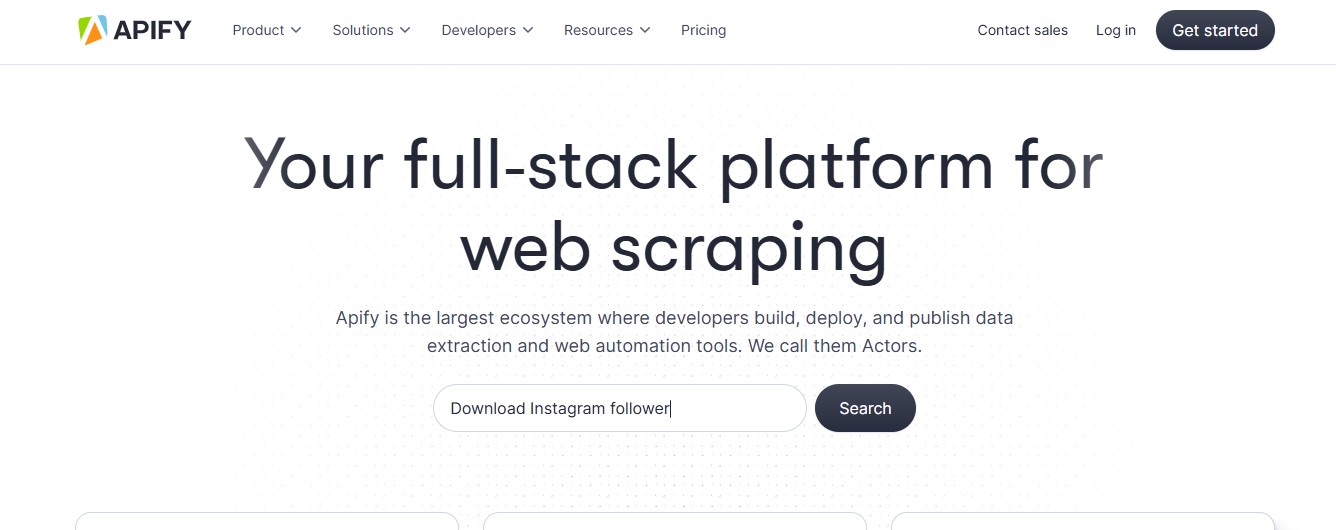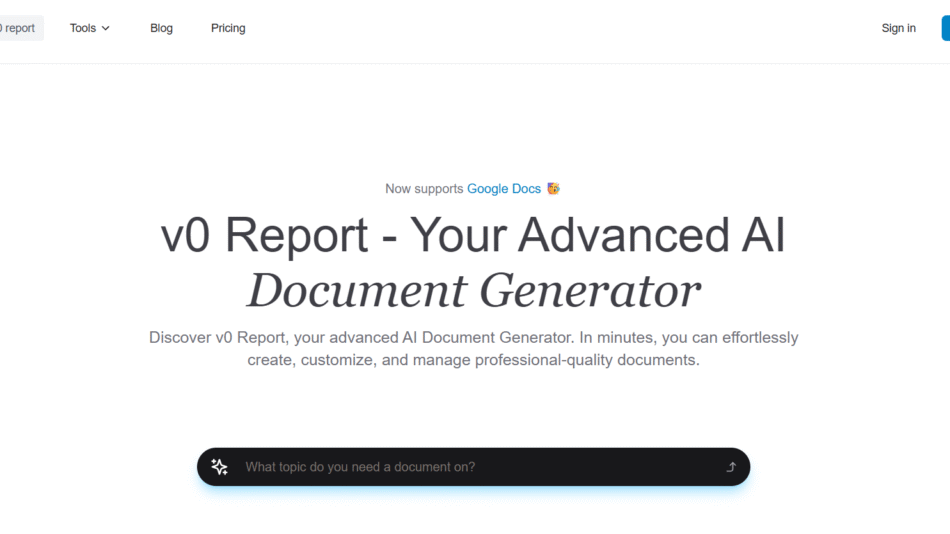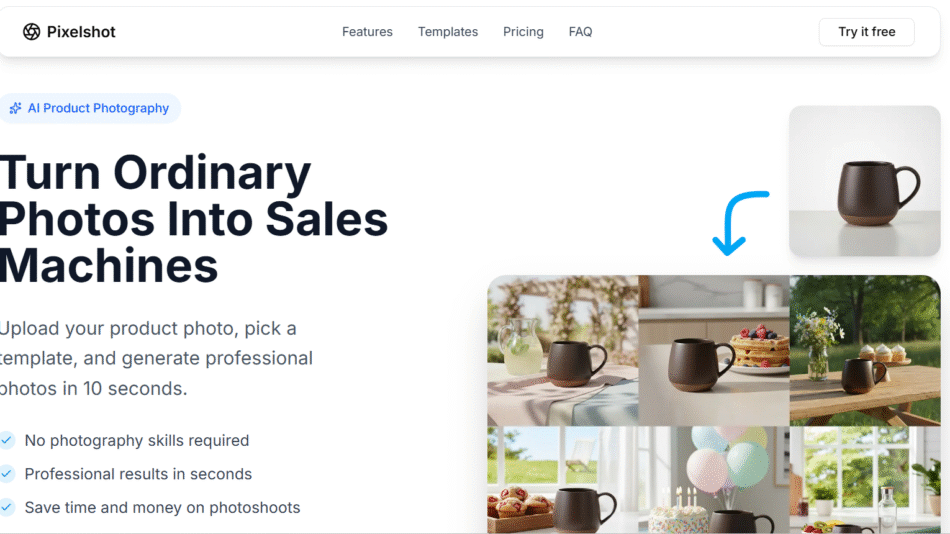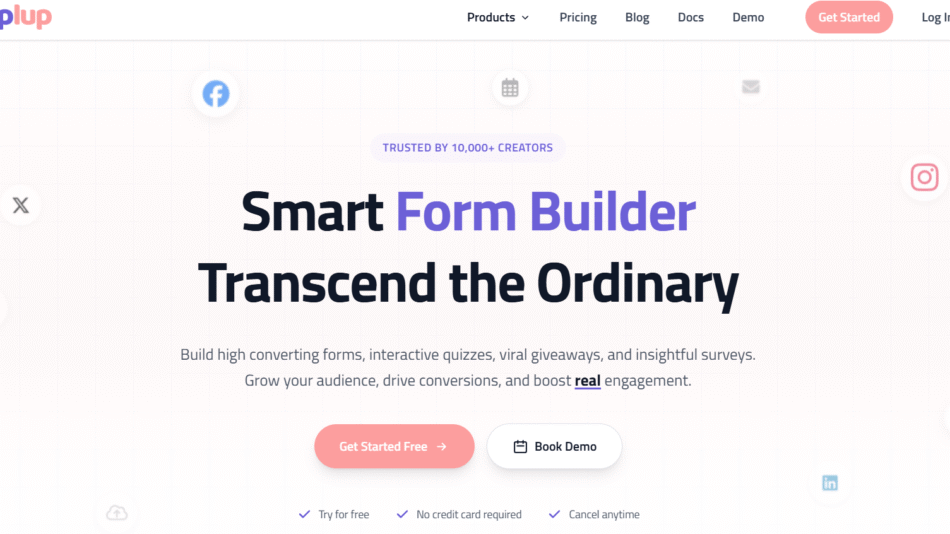Apify is a cloud-based platform designed for automating web scraping, data extraction, and workflow automation. It enables users to gather data from websites, APIs, or apps and convert it into structured formats like JSON, Excel, or CSV.
With its powerful APIs, pre-built scraping templates (called “actors”), and a scalable infrastructure, Apify caters to developers, businesses, and researchers looking to harness data for decision-making, analysis, and automation. From scraping e-commerce prices to monitoring social media mentions, Apify makes web data extraction accessible and efficient.
Features of Apify
Apify is packed with features that simplify web scraping and automation. Here are its standout capabilities:
- Pre-Built Actors
- Use a library of ready-to-use web scrapers (known as actors) for common use cases like scraping Amazon, LinkedIn, Google Maps, and more.
- Custom Web Scraping
- Build and deploy custom scrapers using JavaScript or Apify’s code editor to handle unique data requirements.
- Headless Browser Support
- Utilize headless browsers like Puppeteer and Playwright for scraping dynamic websites and handling JavaScript-heavy pages.
- Data Export Options
- Export data in multiple formats, including JSON, CSV, XML, Excel, and HTML, for seamless integration into your workflows.
- API Integration
- Automate data extraction workflows with Apify’s APIs, enabling easy integration with your software stack.
- Task Scheduling
- Schedule scraping tasks to run automatically at specific intervals, such as daily, weekly, or hourly.
- Proxy Management
- Rotate IP addresses and use proxy servers to avoid detection and ensure uninterrupted scraping.
- Cloud Storage
- Store your extracted data securely on Apify’s cloud servers or integrate it with external storage solutions like AWS S3 or Google Cloud.
- Scalability
- Scale your web scraping operations to handle high volumes of data without worrying about infrastructure management.
- Developer-Friendly
- Supports Node.js-based SDKs, allowing developers to create and manage their own scrapers with ease.
How Does Apify Work?
Using Apify is simple and efficient, whether you’re leveraging pre-built scrapers or building your own from scratch. Here’s how it works:
- Sign Up and Log In
- Create an account on the Apify platform to access the dashboard.
- Choose a Scraper (Actor)
- Browse Apify’s library of pre-built actors or create your own custom scraper using the code editor.
- Input Your Parameters
- Define the target website, data fields you want to extract, and any additional configurations like proxies or schedules.
- Run the Task
- Start the scraper to collect data. Apify processes the task on its cloud servers and handles dynamic websites with ease.
- Review and Export Data
- Once the scraping task is complete, review the collected data and export it in your desired format (e.g., JSON, Excel).
- Automate and Scale
- Automate recurring tasks with Apify’s scheduling feature and scale operations as needed to handle larger datasets.
Use Cases of Apify
Apify’s versatility makes it suitable for a wide range of industries and applications. Here are some common use cases:
- E-commerce Price Monitoring
- Track competitor prices, product availability, and discounts across e-commerce platforms like Amazon, eBay, and Walmart.
- Lead Generation
- Extract contact information, business directories, and customer reviews from platforms like LinkedIn, Yelp, and Google Maps.
- SEO and Marketing Analysis
- Scrape search engine results, keyword data, and backlinks to refine SEO strategies and monitor competitors.
- Social Media Monitoring
- Collect data on hashtags, mentions, or brand sentiment from platforms like Twitter, Instagram, and Facebook.
- Real Estate Listings
- Gather property data, pricing trends, and location details from real estate websites like Zillow or Realtor.com.
- Academic Research
- Extract large datasets for research purposes, such as analyzing market trends, consumer behavior, or public sentiment.
- News Aggregation
- Scrape articles, headlines, and updates from news websites for media monitoring or content curation.
Pricing
Apify offers flexible pricing plans to suit individual developers, small businesses, and enterprises. Below is an overview (accurate as of January 2025):
- Free Plan:
- Includes 1 GB of storage, 10,000 compute units, and access to the actor library.
- Personal Plan: $49/month
- Includes 20 GB of storage, 100,000 compute units, task scheduling, and premium support.
- Team Plan: $149/month
- Offers 50 GB of storage, 400,000 compute units, multi-user access, and advanced API features.
- Enterprise Plan: Custom Pricing
- Tailored solutions with unlimited storage, high compute limits, custom SLAs, and dedicated support.
For the most accurate pricing details, visit the Apify pricing page.
Strengths of Apify
- Scalable and Flexible: Handles small tasks to large-scale data extraction with ease.
- Pre-Built Solutions: The actor library saves time by providing ready-to-use scraping templates.
- Developer-Friendly: Provides tools and SDKs for developers to build and customize scrapers.
- Wide Range of Export Formats: Offers flexibility in how you receive and use extracted data.
- Proxy Management: Prevents scraping blocks and ensures seamless operation.
Drawbacks of Apify
- Learning Curve for Beginners: While pre-built actors simplify tasks, building custom scrapers may require coding knowledge.
- Cost for Advanced Features: Larger-scale operations and premium features may be costly for small businesses.
- Platform Dependency: Relies on the cloud for scraping tasks, which may not suit businesses needing on-premises solutions.
Comparison with Other Tools
Here’s how Apify compares to other popular web scraping tools:
- Scrapy: Scrapy is an open-source framework for web scraping, but it requires significant technical expertise, whereas Apify provides a more user-friendly interface.
- Octoparse: Octoparse offers no-code scraping, but Apify stands out with its advanced developer tools and API integration.
- ParseHub: ParseHub is beginner-friendly, but Apify’s scalability and automation options make it more suitable for complex workflows.
Customer Reviews and Testimonials
Here’s what users are saying about Apify:
- Emma R., E-commerce Manager: “Apify makes price tracking effortless. We’ve saved hours of manual work by automating our data collection.”
- John T., Marketing Specialist: “The pre-built scrapers are a game-changer! Setting up a Google Maps scraper took just minutes.”
- Sophia L., Research Analyst: “I love how Apify allows me to extract structured data without worrying about website complexities.”
Conclusion
Apify is a powerful tool for businesses, developers, and researchers looking to streamline web scraping and data extraction. With its pre-built solutions, customizable scrapers, and scalability, it caters to a variety of needs, from price monitoring and lead generation to academic research and marketing analysis.
While it may require some technical knowledge for advanced features, its user-friendly interface and automation capabilities make it accessible for users of all skill levels. If you’re ready to simplify your data collection processes and take advantage of actionable insights, Apify is an excellent choice.















